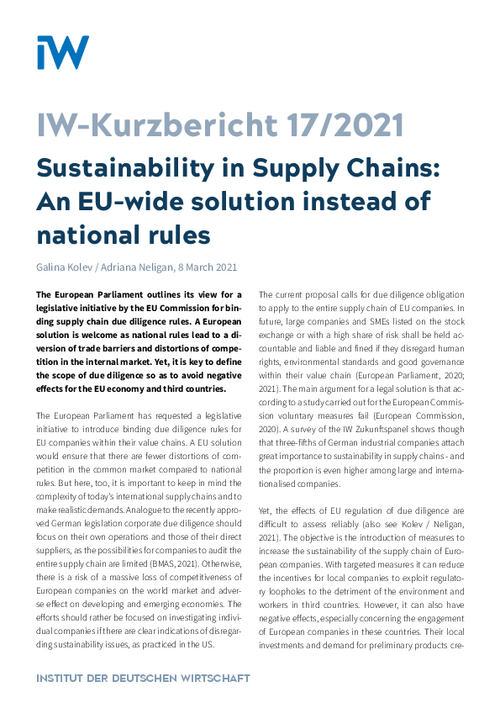The European Parliament outlines its view for a legislative initiative by the EU Commission for binding supply chain due diligence rules. A European solution is welcome as national rules lead to a diversion of trade barriers and distortions of competition in the internal market. Yet, it is key to define the scope of due diligence so as to avoid negative effects for the EU economy and third countries.

Sustainability in Supply Chains: An EU-wide Solution Instead of National Rules
IW-Kurzbericht

The European Parliament outlines its view for a legislative initiative by the EU Commission for binding supply chain due diligence rules. A European solution is welcome as national rules lead to a diversion of trade barriers and distortions of competition in the internal market. Yet, it is key to define the scope of due diligence so as to avoid negative effects for the EU economy and third countries.
The European Parliament has requested a legislative initiative to introduce binding due diligence rules for EU companies within their value chains. A EU solution would ensure that there are fewer distortions of competition in the common market compared to national rules. But here, too, it is important to keep in mind the complexity of today's international supply chains and to make realistic demands. Analogue to the recently approved German legislation corporate due diligence should focus on their own operations and those of their direct suppliers, as the possibilities for companies to audit the entire supply chain are limited (BMAS, 2021). Otherwise, there is a risk of a massive loss of competitiveness of European companies on the world market and adverse effect on developing and emerging economies. The efforts should rather be focused on investigating individual companies if there are clear indications of disregarding sustainability issues, as practiced in the US.
The current proposal calls for due diligence obligation to apply to the entire supply chain of EU companies. In future, large companies and SMEs listed on the stock exchange or with a high share of risk shall be held accountable and liable and fined if they disregard human rights, environmental standards and good governance within their value chain (European Parliament, 2020; 2021). The main argument for a legal solution is that according to a study carried out for the European Commission voluntary measures fail (European Commission, 2020). A survey of the IW Zukunftspanel shows though that three-fifths of German industrial companies attach great importance to sustainability in supply chains - and the proportion is even higher among large and internationalised companies.
Yet, the effects of EU regulation of due diligence are difficult to assess reliably (also see Kolev / Neligan, 2021). The objective is the introduction of measures to increase the sustainability of the supply chain of European companies. With targeted measures it can reduce the incentives for local companies to exploit regulatory loopholes to the detriment of the environment and workers in third countries. However, it can also have negative effects, especially concerning the engagement of European companies in these countries. Their local investments and demand for preliminary products create jobs. About 215,000 employees in Africa for example owe their jobs to German direct investments according to data by the German Bundesbank, and another 700,000 jobs have been created resulting from German direct investments in Asia outside China.

Galina Kolev / Adriana Neligan: Sustainability in Supply Chains – An EU-wide solution instead of national rules
IW-Kurzbericht

More on the topic
Not so Different?: Dependency of the German and Italian Industry on China Intermediate Inputs
On average the German and Italian industry display a very similar intermediate input dependence on China, whether accounting for domestic inputs or not.
IW
China’s Trade Surplus – Implications for the World and for Europe
China’s merchandise trade surplus has reached an all-time high and is likely to rise further. A key driver appears to be a policy push to further bolster Chinese domestic manufacturing production, implying the danger of significant overcapacities.
IW